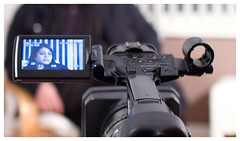As much as I miss the island, living with Elif’s mother has its rewards. Although staying for two nights at my own parents’ house can bring me back to the dynamic of them treating me (and me acting) like I’m 14, Dilek treats me like a Sultan, which I tend to favor. She works from 8 in the morning to 9 at night, and I sometimes find her up at 5AM, ironing my underwear. One day I got into a big fight with her: I made my own juice in her juicer and wanted to clean it up, and she wouldn’t let me clean it because I am a man and I am her guest. I insisted, since she’d just come in from a long day at the office; Elif interfered, and there was lots of door-slamming and crying.
I ran up a large bill on Dilek’s telephone line, since her Internet charges by the hour. I emailed US camera stores and researched equipment reviews, as well as brushing up on articles about filmmaking techniques. I learned as much about modern Turkish history as I could. After doing the math, I realized that shooting on digital video would be the cheapest way to film dozens of interview subjects and let them tell their stories; I also realized that I would have to hire at least two cameramen, if only to drag our equipment all around Istanbul, what with its being in two continents, both having massive amounts of traffic.
We interviewed several candidates for cameraman, and most were disastrously wrong for the project. Many wanted us to spend the first three years researching the film; if we were to listen to their advice, some of our older subjects will be dead before we ever get a chance to shoot. The two cameramen we selected make typical documentary work in Turkey – pretty-looking, overly-edited, overly-romantic. A practice shoot revealed that they knew a thing or two about lighting. Above all, they want to have visual ideas but not political ones, which is perfect for us; it will be easier to ignore their visual ideas, which we could better control than if they’d try to steer our choice of interview questions or subjects.
One is named Metehan Aras, who’s 38 but looks 19, and the other is Baris Bidav, who was 28 but looks 19. Metehan just broke up with his girlfriend. Both of them are huge bears, over 6 feet tall, 230 pounds. This is helpful, because Dilek’s elevator is broken again, and she lives on the 5th floor, so every day they have to carry the equipment. They’re a couple of real goofballs – they giggle like schoolchildren and behave like K’s assistants in Kafka’s The Castle. Every day during the shoot, they repeat the same joke: They’d seen a sitcom, in which a boy with diminished faculties watches a cameraman do a fashion shoot of beautiful women and exclaims, “Ya baba ya, KAMERAMAN olacagim!” (“Yo dad, I’m going to be a CAMERAMAN!”) They would always ask me, “What are you going to be?” and wait for me to say, “Ya baba ya, PESEVENK olacagim!” (“Yo dad, I’m going to be a PIMP!”), at which point they would fall down laughing, even after the 37th repetition. Though they were strong and sometimes amusing, the first time they saw the monitor I brought from the US, they plugged it directly into the wall instead of into the step-down transformer

, and it fried the power supply immediately. I was no longer amused.
